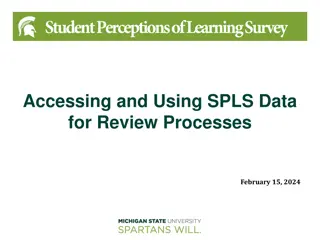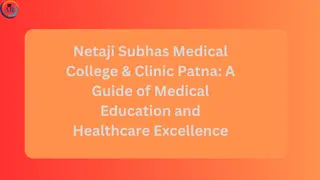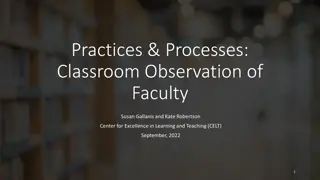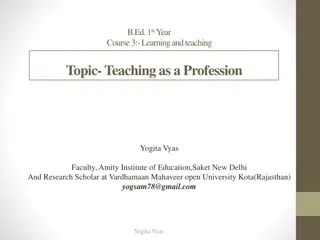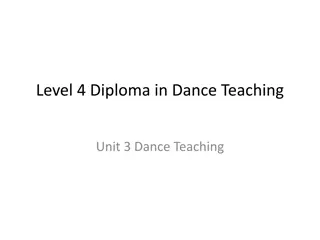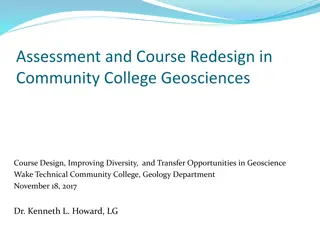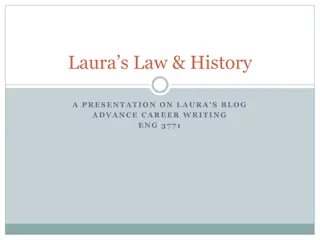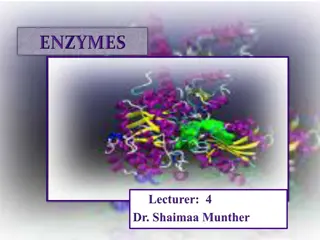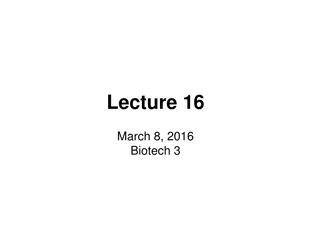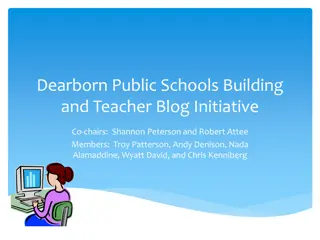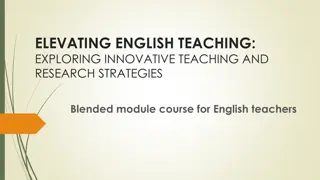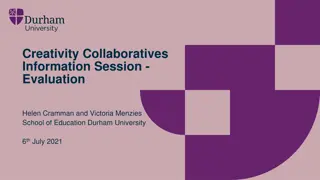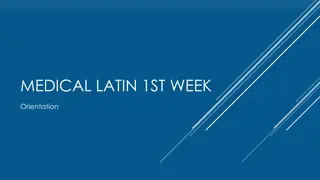Evaluating Course Blog for Teaching Medical Biochemists
Integrating a course blog to teach second-year Medical Biochemists offers a comprehensive approach to core topics like bioethics, drug design, and molecular techniques. The assignment shift to a Shared Resource Collection encourages reflection and engagement, replacing traditional exam assessments with a more interactive learning method. Explore the rationale, content details of the module, and the benefits of this innovative teaching approach.
Uploaded on Feb 21, 2025 | 1 Views
Download Presentation

Please find below an Image/Link to download the presentation.
The content on the website is provided AS IS for your information and personal use only. It may not be sold, licensed, or shared on other websites without obtaining consent from the author.If you encounter any issues during the download, it is possible that the publisher has removed the file from their server.
You are allowed to download the files provided on this website for personal or commercial use, subject to the condition that they are used lawfully. All files are the property of their respective owners.
The content on the website is provided AS IS for your information and personal use only. It may not be sold, licensed, or shared on other websites without obtaining consent from the author.
E N D
Presentation Transcript
Horizons in STEM Higher Education Discussion boards don t work : Evaluating use of a course blog for teaching Second Year Medical Biochemists Dr Chris Willmott Dept of Molecular and Cell Biology University of Leicester cjrw2@le.ac.uk
Context Second year core module for Medical Biochemists (n=34) Usually three assignments: - Video on a bioethics topic (30%) - Graphical abstract (30%) - End of module SAQ paper (75 mins, 40%) This year: End of module exam replaced by development of a Shared Resource Collection Spoiler: This will be a warts n all description https://tinyurl.com/CromwellWarts
Content of module MB2050: Applications of Medical Biochemistry Bioethics Drug design and development Molecular techniques in medicine and research Nucleic acid hybridisation Genomics Video project Protein expression Scientific principles (Dovetails with bioethics content in BS2000) CRISPR & Genome editing Therapeutic inhibitors Monoclonal antibodies Developing antibacterials Antibody-based assays Structure-modelling exercise
Rationale for assignment Assessment = driver for engagement Previously: exam only assignment in module that re-visited breadth of the lecture programme Looking for replacement that would require students to reflect on multiple topics within the module Decided to Shared Resource Collection - Submitted as blog posts and comments, using integrated Blackboard tool
Shared Resource Collection assignment Basket 1 Basket 2 Scientific Principles in Drug Design Structure-Activity Relationships Nucleic Acid Hybridisation techniques Developing a Pharmaceutical/ Antibiotics Therapeutically Useful Antibodies Molecular Visualisation/ Enzyme inhibitors Plasmid Structure and Protein Expression CRISPR and Genome Editing Functional Genomics Immunity and Antibodies Monoclonal Antibodies/ Antibodies in Research T cells and Transplantation Window 1 Window 2 Window 3 Window 4 29th October 17th November 3rd December 11th January 21
Benefits of SRC assignment Replaces exam in module Benefits: - developing resource location and critical evaluation skills important for yr 2 and yr 3, especially for your project - evidence of outside reading and/or originality of thought and analytical skill needed for access to highest coursework marks - no revision for this module over Christmas than they would for exam - anticipate most people will achieve higher marks in this task
Shared Resource Collection assignment Students must submit (at least) one review in each window Submissions must have standard format: Name of resource (including link, if applicable) The review (max 300 words) Date of review Author s name Name of lecture block with which the review fits
Shared Resource Collection assignment Students could earn up to 10 credits per window Four windows = 4 x 10 = 40% of mark for module Students must submit one post per window, but not limited to one Additional posts, and appropriate comments on other people s posts, could also receive credit Additional posts/comments can earn no more than 4 credits in any window
Example marking scenarios Alex submits one post worth 9 marks with no supplementary post in that window or comments on other people s posts Total mark = 9 Bindu submits one post worth 8 marks, plus two additional supplementary posts and comments on other people s posts which are considered worthy of the full 4 additional marks Total mark = 10 (you cannot exceed 10 marks per window) Charlie submits one post worth 7 marks, plus a additional supplementary posts considered worthy of 3 additional marks. Total mark = 10
Example marking scenarios (continued) Dina submits one post worth 5 marks, plus two additional supplementary posts and comments on other people s posts which are considered worthy of the full 4 additional marks Total mark = 9 (you cannot boost mark for principal post by >4) Edgarmakes comments on other people s posts that would have been worthy of 2 marks, but fails to submit any post of their own during a relevant window Total mark = 0 (submitting your own work is a necessary threshold to achieve any marks in a given window)
What types of resources? Flexible = following list is not exhaustive (if in doubt, please check applicability before posting review) Books Primary research papers Review articles Websites (authoritative) Multimedia resources: Podcasts, TV and radio programmes, YouTube videos, etc NB You may not write reviews of any of papers provided for the Graphical Abstract task, nor any that fit theme of your bioethics video
Marking criteria Relevance to taught course how well does it fit with the lecture block you have identified? Quality of reflection/thought posts must do more than just summarise content. Offer reflection or critical thinking about resource [note: this is good training for next year s project]. Quality of writing is review well written and free from errors? Originality a post will be valid if someone else has also reviewed it, provided review is entirely different. Intentional contrasting of perspective is welcomed. Repeated selection of same resources reviewed by others will be penalised.
Comments To be eligible for credit, comments must demonstrate critical thinking Great post This resource/review was rubbish Thank you for your interesting observations on the programme. I didn t find it quite as helpful as you appeared to, because Additional to the valuable points you ve already made, I also thought this was an excellent resource because
Discussion boards dont work? Was my colleague right?
Discussion boards dont work? Was my colleague right? No: - Quality of some of the shared resources was excellent - Students enjoyed the assignment - Students recognised acquisition of skills & knowledge via task - Some aspects of reviews improved
Discussion boards dont work? Was my colleague right? No: - Quality of some of the shared resources was excellent - Students enjoyed the assignment - Students recognised acquisition of skills & knowledge via task - Some aspects of reviews improved Yes: - Blog post marks did not improve across windows - Posts did not elicit interactivity in way we hoped
The quality of blog posts did not improve significantly over time * First posts were generously marked A good post needed two dimensions: - focus on a valuable resource, - review involving critical thinking ( > summarising content) Few posts hit sweet spot with both dimensions Students did not engage sufficiently with other people s posts and/or feedback to gain the intended benefits from task
Some posts elicited responses, but few led to significant discussion Some posts received comments, but this rarely led to back-and-forth discussion ( interactivity ) and/or multi-person commentary An important contributory factor to the limited interactivity was posting of reviews shortly before deadline
Number and timing of posts Between 35% (Window 1) and 60% (Window 3) of reviews were submitted less than 12 hours before the 8 AM deadline (or were late) 50 47 39 37 Ability to establish discussion on the content was therefore significantly restricted
Distribution of review postings Reviews about any topic could be posted in two valid windows No-one posted about a topic prior to coverage in the core programme Students only really cross-posted about W1 topics during W3 This may have been due to less new material being covered in W3 One comment was posted on a W2 review during W4
Students achieving maximum mark (n=34) By Window 4, 53% of students were achieving maximum marks for their contributions 18 13 Most (41%) were achieving this via writing of two posts 8 6 Some students did not achieve 10 marks, despite >1 contribution if principal post worth 5 or less
Are we running this assignment next year? No Exercise already valuable and could have been tweaked to improve However: - Burden of marking and especially timing of marking was issue (even before substantial increase in cohort size in 21-22) - Marks for module considered too high Exams are permitted again
If you are considering running a similar task Give annotated examples of posts a priori, overtly detailing strengths and weaknesses. Include: - review of excellent resource that lacks critical thinking - good reflection on a poor resource - good review of an excellent resource Ditto for comments Suggest having a deadline for posts and a later deadline for comments within same submission window (and/or require comments) Identify platform that would allow multiple, anonymous contributions
Any questions? E-mail: cjrw2@le.ac.uk Twitter: cjrw Slideshare: cjrw2 Blogs: www.biologyonthebox.wordpress.com www.biosciencecareers.wordpress.com www.lefthandedbiochemist.wordpress.com Biology in Broadcast Media playlist https://tinyurl.com/BiBMplaylist
Positive comments: Skills development Aided my ability to think critically when looking at reviews that I want to use in other areas of the course Makes you think critically about what information is relevant Developed my critically thinking skills The activity improved my research skills and evaluation skills Helps develop research skills Improved research skills Aided my ability to be succinct with my words
Positive comments: Content & Knowledge Improved knowledge from lectures It reinforced knowledge from recorded lectures Actually made me read more into topics Get to see things from other people's perspectives Able to read other blog posts A more effective way of testing your understanding of the topic because you have to evaluate sources
Positive comments: Pragmatics Provided a more relaxed piece of work to gain credit alongside exams and bigger projects Caused much less stress than exams Took time but not too much - not overwhelming It was nice that it was short Allowing multiple post submissions to gain marks It provided an opportunity to find material that is of personal interest to us rather than already provided Flexible resources could be used
Negative comments: Not anonymous Anonymous submission, such as maybe using student ID rather than name. My feedback was mostly negative and I felt a little embarassed [sic] to have everyone know Posts should be anonymous to elimate bias [sic]
Negative comments: Marking guidance Explaining how to pick up marks - I received the same mark for each post even though I thought my later posts were better so I feel like I didn't improve at all Examples of blog post to start before the first post Definitely provide more examples of sources and more specific marking criteria. It was very hard to improve from post to post if the feedback provided was brief and did not provide specific targets for improvement.
How did you find 300 word limit? Far too short 0 Too short 3 About right 11 Too long 0 Far too long 0
Requirement for four post during term (10% per submission window) Too many for this amount of credit 3 The right number for this amount of credit 10 Too few for this amount of credit 1


